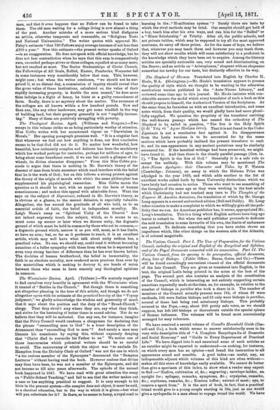The Shepherd of Ilermas. Translated into English by Charles H..
Hoole, M.A. (Rivingtons.)—Mr. Hoole's translation appears to possess the quality of style which we thought to be wanting in the otherwise meritorious version published in the "Ante-Nicene Library," and reviewed some timo ago in this journal. Mr. Hoole imitates with con- siderable success the model which every translator of such a book as this- should propose to himself, the Authorized Version of the Scriptures. At the same time, he furnishes us with an excellent introduction, and some notes which, from their quality, we would gladly have had more plenti- fully supplied. We question the propriety of the translator omitting the well-known passage which has caused the orthodoxy of The Shepherd to be called in question, " The Son is the Holy Spirit
(i Trb; Tb " Apo v crrty). That it is not found in the Codex Lipsiensis is not a conclusive fact against it. Its disappearance from the Latin versions is to be accounted for by the same motives which have probably inclined the present translator to omit it; and its non-appearance in any ancient quotations may be similarly accounted for. If the heretical writings had been preserved, we might have found it. And then there is the closely parallel passage (Gen. ix. 1), "The Spirit is the Son of God." Generally it is a safe rule to accept the unlikely. With this volume may be mentioned The Ante-Nicene Apologies : their Character and Value, by F. Watson (Cambridge : Johnson), an essay to which the Hulseau Prize was. adjudged in the year 1869, and which adds another to the list of excellent works called forth by these University distinctions which we' have lately had occasion to notice. Those who want to see something of the thoughts of the same age as they were working in the best minds which Christianity had not touched may turn to The Thoughts of the Emperor If. Aurelius Antoninus, the translation of which by Mr. George Long appears in a second and revised edition (Bell and Daldy). Mr. Long takes occasion to make a complaint to which we willingly give all the pub- licity that we can. An American publisher has, it seems, appropriated Mr_ Long's translation. This is a thing which English authors have long ago learnt to submit to. Bat when the said publisher proceeds to dedicate the said translation to some favourite of his own, the limits of endurance( are passed. To dedicate something that you have stolen shows an impudence which, like other things on the western side of the Atlantic-, is of colossal magnitude.


































 Previous page
Previous page